A timelapse video showing the forward section of HMS Glasgow, the first Type 26 Frigate, being rolled out of the build hall at Govan today.
The Type 26 represents the future backbone of the Royal Navy and eight of the class are planned, starting with HMS Glasgow.
The forward ‘superblock’ will be joined to the aft ‘superblock’ over the coming weeks to form one complete Type 26 Frigate hull.
The Type 26 represents the future backbone of the Royal Navy and eight of the class are planned, starting with HMS Glasgow. The eight ships will replace the eight dedicated anti-submarine Type 23 frigates which will reach the end of their active lives by the mid 2030s.
In addition to the Clyde built Type 26, five Rosyth built Type 31 general purpose frigates are intended to replace the general-purpose Type 23s currently in service and also coming towards the end of their long careers.


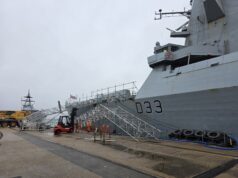
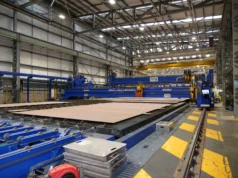
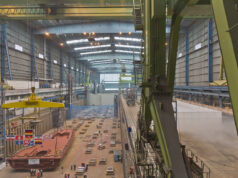

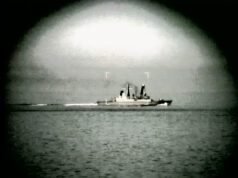
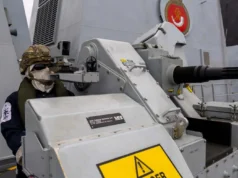

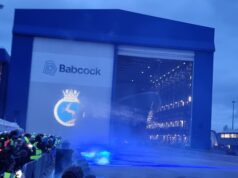
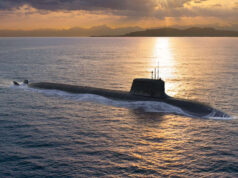
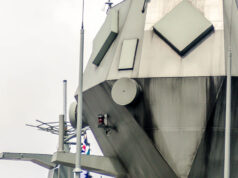

I take it the UK Gov had advance knowledge of the SNPs plan to implement a 4 day week , which is why they have an operational date of 2027 for the above ship
Right, its only been 20 some years to this point.
Lots of evidence around the world that 4 x 10 hour days increase productivity per hour worked and reduces unplanned absenteeism. Sweden has done a lot of projects on that basis and I’ve done it myself for a couple of years. You can also still have 6 or 7 day operations at site and stagger resources or even trades to certain days .
Where is the rear block?
Paul a little more info here:
https://www.navylookout.com/building-hms-glasgow-the-first-type-26-frigate/
Thanks. So is the stern block ready for roll out?
Yes it is – will be Rolled outside shortly for the ‘Mating’ of the Two Hull Sections.
Great, be good to finally see her more or less in one piece at last!
At the back.
That’s what they are asking at the yard?
Just like manoeuvring a car out of the garage and trying not to bump into anything!
It is strange the way the RN describe type by role (i.e. all GP or ASW warships are frigates and all AAW warships are destroyers). Other Navies classify by size. Our T45s, at c8000 tonnes are really AAW cruisers (especially if they had Tomahawk). These T26s are really large multi-role Destroyers and the T31 are also in the Destroyer bracket by size (although their weapons fit doesn’t match that title). Maybe a more fitting description of all these new ships, as well as new warships in foreign navies, would be to call them all battleships because they are the principle war fitting platforms?
I think there is still a place for smaller specialist platforms though. I wonder if the RN have a small ASW escort sloop / corvette design up their sleeve should we ever need to crash build low tech escorts in numbers (like the WW2 Flower Class). Even if we never build them I think it would be wise to have a plan worked out as the present and future fleet is only large enough to provide escorts to major warships. What would happen if we ever needed to convoy our merchant fleet?
T31 weapons fit doesn’t match the frigate title!
Leanders of various mods had less weapons than a T31 and where frigates.
Bit of a moot point I would have thought. 2 x 4.5 inch, Seacat, 2 x 40mm Bofors, 2 x20mm canon…ASW mortars, wasp etc….and half the tonnage at 2600.
But then you ended up with Exocet mod, Ikara, Seawolf mod that where bloody awful.
I agree, rather hard describe what it was when the big guns went!
No navy classifies by size. The UK uses NATO standards.
Just like Americans, everything gets bigger!
I think you have answered your own question. (although their weapons fit doesn’t match that title).
It is interesting though, as the ships get larger and the crews get smaller what is all the space used for? Wider corridors, better hotel services, less gun stuff, but more missile stuff and sensor suites to match. Power gen must be massively more space efficient over steam boilers and coal stores.
Because it’s not just the hulls that take time to build, the days of “crash building” ships, even low tech, have long gone. I always worry that just because we got away with it in 1982 the politicians and the public assume that when the proverbially hits the fan we can assemble an armada (air or sea) in a a matter of weeks and an army in even less time.
WW2. Between March 1940 & June 42 Britain built (some in Canadian yards) 225 Flower Class corvettes, manned them from the Navy Reserve and each ship received ASDIC, BL 4inch Gun, a 2 pounder AA gun, 2 x 20mm AA guns, depth charges and in some cases a depth charge mortar (hedgehog). That was a basic but nevertheless complex weapons fit for those days. If we had to do the same it could be done. The future ‘Flower Class’ would need sonar, a medium gun, probably something like a 40mm Bofors for basic air defence and a helicopter to drop anti-submarine torpedoes. Needn’t be more than 1500 tonnes.
It’s been mentioned about having Sloops\Corvettes\OPV in the RN many times on here.
We could build plenty of ships like them if the shipbuilding strategy clearly defined what the RN needed and what for.
Give all the yards work
We would also need to find numbers to crew them
Can’t see it ever happening though, not with future T31 and T32 entry into service
I’m not saying we should build them because a peace time Navy doesn’t need them but it would be good to at least invest in a design so that if the worst happens….
By the time you’ve fitted a towed sonar array, a medium gun, anti-submarine torpedoes, a hangar and flight control, and all the sensors you’d need to get usefulness out of it, you’re looking at something that will cost about the same as a type-31.
At which point, why not make it 5,000t with the range and endurance to cover global commitments with space for upgrades, instead of a cramped 1,500t design that will be a nightmare to upgrade, will be much less comfortable for the crew, and will have shorter range on top of it?
Indeed. Churning out liberty ships at 2 per day and Spitfires by the dozen is from a past age. If a sudden Falklands type conflict were to erupt again then you have to rely on what you have got. Fortunately in 1982,the Royal Navy had a big enough fleet(just) to suffice for task.
My Father served in HMS Euryalus just after the end of WW2, a light cruiser at just over 7,000 full load, frigates were about 1,600 tons at the time!
Yeah Nick. It’s because, a) missile silos take up more room than guns and b) modern sailors need a fold up bunk, stowage and a wi-fi connection (not their fault it is just the way the world is). Now imagine a WW2 cruiser like Euryalus or Belfast. There would be hammocks everywhere. On an arctic run it would have every other space full of drying clothing. In the Med or east of Suez the smell of several hundred sweaty bodies must have been horrendous.
Definitely, times have certainly changed. I went to sea 1970 when some ships still had hammocks, and the tot went on 1st April that year. And we were dealing with a lot of high explosive and the first rather complicated computers.
..no Mum for Men in those days
You want to try a T23 in the aft accom when its hot. Truly awful…then again it wasn’t much better up fwd.
The AC was always carp but It has improved now that seawolf has been removed and the chilled water for the trackers is no longer required.
..as were some destroyers with displacements considerably less than the OPV2’s
some destroyers had displacements condiserbly less than the Hunt and Sanddown class minesweepers.
Most countries don’t use the term “destroyer” because they feel it’s too “aggressive” a term. Even countries like France that have frigates the size of US or UK destroyers still call them frigates. To each their own I guess.
It’s slightly more complicated than that though, given that most other countries don’t use English. Both the French and, even more so, the Germans have for a very long time avoided the terms Zerstoerer and contre-torpilleur, to the point where even during ww1 the German navy didn’t have any destroyers, just “torpedo boats.”
Remember also that the US Navy didn’t have “Frigates” until the 1970’s, only Destroyers (not because they didn’t have them, that had to wait until the LCS to happen, but because they just didn’t call them Frigates).
Calling T45s cruisers because of their tonnage is silly, same as calling T31’s and T26’s Destroyers because of their tonnage. The original Destroyers came in at about 200t displacement, size creep is a thing and it’s not a recent phenomenon.
Yes, unfortunately size creep is a constant factor for me as well!
Dit on…
A certain T22 batch 3 rocked up into Guz and rolled down a canvas cover with a big C painted on it in the usual pussers black and white , covering the F in front of the pennant number.
Much guffawing and jolly japes until the old man got told to put on his No1 suit, medals and pick up his sword and go and have “coffee and a sit down chat” with the Admiral (Negative Coffee , negative sitting down and it was all one way transmissions with the CO switched to receive only!)
Anyway the RN did away with “Cruisers” many decades ago because it was seen as an imperial designation relic. After that the RN stuck to NATO designations.
Remember County Class Destroyers? They had the designation DLG- Destroyer Light Guided originally and they came in at 6500 Tons in the 1960s which was hardly light!
County class…a good looking vessel. Fitted with seaslug as I remember. Not sure how good a SAM it was…took up a lot of space though!
SeaSlug certainly lived up to it’s name.
County class did well in the Falklands war.And agree fine looking ship’s.
The Counties provided excellent NGS support. The missile fit provided nothing of use, whatsoever.
One Sea Slug was fired in a surface to surface mode in support of the assault on Stanley Airfield (if I recall well) and by all accounts created the most almighty bang. The only problem is that it landed nowhere near where it was supposed to, so a halt was called to the firing. In case they hit SF in the area. It was sold as precision radar guided it might have been vaguely pointed in the direction using radar but that was about the best you could say for it.
Having seen Sea Slug firings, first hand, I can tell you what a god awful system it was. However, great the crew is, if they are given rubbish to operate……it was also very hazardous for the crew as the propellants were not nice……nor was it very pleasant to be sent into the magazine to hand crank the ‘blast doors’ open to get a missile to load….as they inevitably got stuck….that was mainly due to salt water plus micro switches…..it was a proper electro mechanical system….
So sorry, I have to disagree with the sentiment of your statement,
No problem thank you for your post it’s interesting to know.
Yep awful system. It needed a bucket of sunshine attached to do any meaningful damage to Soviet bomber formations and they didn’t go for that option.
It was a beam rider so it was always going to be chasing the target unlike Sea Dart that used future point of impact to get where it was needed.
I spent a bit of time (1week) on Fife helping out the Gun maintainer at Portland during FOST. That was enough for me.
For its time, the radar tracker was very good at staying locked on to a target, as it was one of the first radars that used a circular track while scanning technique. This was the same technique developed for the Bloodhound system. For Bloodhound, it allowed the system to track and engage two targets simultaneously, so long as the targets were within the circular scanning beam.
Trained on the Sea Slug radar system during Poly. First time I saw working and live electricity. Learned a lot of respect with working with valves after a few belts.
Yes, know what you mean. I trained on Marconi marine transmitters…top cap anodes with 1KV on them. Not a nice surprise…..
I am still pretty baffled as to how they are going to take another 6 years to build this- lots of tea breaks?
FFBNW……………an aft section.
Or significant defence cuts.
Great to see. Can’t wait to see the joining of the halves.
So can Babcock construct the whole vessel within the Frigate factory?
Babcock are going to build the Type 31 Frigate,not the Type 26,but they will be using similar Block Build methods, and im pretty sure they will assemble the whole Ship Undercover until it Rolls out.
My point was the 26 and 31 are of similar size.
They will be able to construct two vessels side by side. I believe one of the only structural pieces that can’t be fitted is the main mast, which will be craned into place when the hull is moved onto the hard standing (similar to Glasgow).
Looks like it’s trying to escape, creeping out of the shipbuilding hall while nobody’s looking!
Great ships, shame we only get 8 when we’re so dependant on sea trade. It’s great we’re finally getting a few more escorts in a while, but numbers look set to dip below nominally 19 before then.
Pyrrhic victory. 🙁
She’s a beauty. Well done all involved.
Good to see 😀
The caption photo shows exactly what is meant by defence cuts😊
Off-topic, but some latest news on the new French carrier.
15 APRIL 2021
France provides more details on next-generation aircraft carrier
https://www.janes.com/defence-news/news-detail/france-provides-more-details-on-next-generation-aircraft-carrier
Goodness me, the French are going for Catobar…..have they learnt nothing?
Is the bridge island modelled on Notre Dame?
So the French are going to build a 70,000 ton nuclear powered aircraft carrier with multiple new untested EMALS systems in 5 years. Sounds as hypothetical as the aircraft pictured on board.
Possible, POW took 5yrs @65,000 tons and EMALS should be fully operational by then. The question is, will it be worth it!
“Issues for Congress for FY2021 Future Aircraft Carrier Force Level One issue for Congress concerns the future aircraft carrier force level. Decisions on this issue could have implications for the service lives of existing aircraft carriers and/or plans for procuring new aircraft carriers. The future aircraft carrier force level has been a frequent matter of discussion over the years, and (correctly or not) is often the starting point or the center of broader discussions over the future size and composition of the Navy.
Factors involved in discussions about the future aircraft carrier force level include but are not limited to the following: the capabilities and costs (including procurement costs and life-cycle operation and support [O&S] costs) of aircraft carriers and their embarked air wings, and how those capabilities and costs compare to those of other U.S. military forces; the prospective survivability of aircraft carriers in conflicts against adversaries (such as China) with highly capable anti-ship missiles; the numbers of carriers needed to support policymaker-desired levels of day-today aircraft carrier forward presence in various regions around the world; and the utility of carriers for purposes other than high-end combat, including deterrence of potential regional adversaries, reassurance of allies and partners, signaling U.S. commitment and resolve, and noncombat operations such as humanitarian assistance/disaster response (HA/DR) operations.
As discussed earlier, the December 9, 2020, shipbuilding document submitted by the outgoing Trump Administration called for a future fleet with 8 to 11 CVNs and 0 to 6 smaller aircraft carriers called light aircraft carriers (CVLs). As also discussed earlier, a March 2021 press report stated that the Biden Administration is considering a reduction in aircraft carrier force structure as part of its FY2022 budget submission.
A reduction in the planned number of CVNs could lead to Navy proposals for one or more of the following: accelerated retirements for one or more Nimitz-class carriers that have already received their mid-life nuclear refueling overhauls (which are called Refueling Complex Overhauls, or RCOHs); the cancellation of one or more planned RCOHs for Nimitz-class carriers that have not yet received RCOHs, and the consequent early retirement of one or more of these ships; a deferral or cancellation of the procurement of CVN-82, which under the Navy’s FY2020 30-year shipbuilding plan was scheduled for FY2028; and/or the deferral or cancellation of the construction of CVN-81, which could require modifying the current two-ship construction contract for CVN-80 and CVN-81.
Procurement of Aircraft Carriers After CVN-81 A related issue for Congress concerns the procurement of aircraft carriers after CVN-81. The question of whether the Navy should shift at some point from procuring CVNs like the CVN-78
https://fas.org/sgp/crs/weapons/RS20643.pdf
I agree the big question is whether going the CVN route is correct in the first place. First with the USSR and now with PRC are putting huge efforts into carrier killer systems and my take is that as of now the advantage is with attack not defence. The USN is clearly looking at more distributed capability in response, which could lead more towards a USMC type solution with say 40,000 ton (non nuclear, non CATOBAR) ships operating F35B.
EMCAT could also be a useful solution for us?
https://www.thinkdefence.co.uk/2014/05/whatever-happened-emcat/
Also worth a read. Area Access Denial is a problem the USA is most concerned about, hence the reason for refuelling UCAVs to keep their carriers out of harm’s way. The question is, how far!
The South China Sea is their main concern at present.
624 Brigade has recently moved to a new base on Hainan Island, presumably to provide the South China Sea with anti-ship ballistic missile coverage.
https://www.nti.org/analysis/articles/chinas-growing-missile-arsenal-and-the-risk-of-a-taiwan-missile-crisis/
Both interesting links, for which thanks.I suspect that the EMCAT article was correct in their view that the MoD needed to focus on getting the Carriers/F35 project operational, and that anything adding substantially to the technical risk already built in to that project was a step too far. I recall the debate whether to instal EMALS+F35C and although cost was cited as the reason for not going there, the USN was at that time finding it problematic getting EMALS into service, imo that was the deciding factor.
The key is readily identifying the location of any anti-ship missiles that pose a threat and take them out with Sub launched Tomahawks and Stealth bombers if needed. All these missile systems are land based in fixed locations and that makes them vulnerable.
Isn’t it odd there’s has to be 5,000 tons bigger than ours.
Surprised to see the Statement of embarking only 2 E2Ds. Unless they back up this with USV AEW aircraft, then they cannot guarantee 24/7 AEW cover. This why the USN has 3 at a minimum and during prolonged ops have 4 aboard.
Just has a good look at HMS Tamar new two tones zig zag colour scheme. Looks quite striking, hopefully they do the same for the other OPV. Nice looking ships although a little under armed. Would be more suited as a Corvette designation.
I guess that was applied during her period in Falmouth? I might need to wander down for a gander…
So what do we call a 6000-7000 ton ship with missiles, guns, torpedos, and a helicopter? Frigate, or destroyer? Is it based on armament, or displacement, or a bit of both?
Neither. It depends partly on what country you are, what your traditions are, and what the displacement and weapons fit of your other ships are.
If you are a nation that uses the words “Frigate” and “Destroyer” (or loose translations there of) and you don’t have specific roles (eg UK having all ASW ships be Frigates), then the question is simply: Are your other class of escort ship bigger or smaller than the newer one, and what are they called?
Type 26 in the UK is a Frigate because it hunts Submarines, Type 31 is a Frigate because it’s similar in size, and the thing its replacing is called a Frigate. In another Navy it might have another name.
Eg the Horizon Class, in the Italian navy it’s called a Destroyer, in the French Navy it’s called a Frigate, in the Royal Navy, it probably could be classed as either.
Realistically call them all battleships because:
1) They are are all primary naval warfare platforms.
2) The difference between a multi role FFG & DDG is minimal.
3) Naval ship design is arriving at culminating point of all arms with containerised specialisms.
It’s a Dreadnaught moment.
Not really, Battleship represents a capital ship, with a very different role to a modern surface escort, the key terms being Capital Ship, and Escort. Probably the closest thing to a Battleship now, in terms of role as a Capital ship or Primary platform, are Aircraft Carriers and LHD’s (and in Russia’s case arguably the Kirovs).
Frigates and Destroyers are more similar to old Cruisers in a lot of ways (ironically given their displacements) than Battleships. Long range ships capable of operating indipendently across the globe, or deploy in flotillas to protect larger capital ships and merchant comerce pretty much sums up the cruiser.
But whatever nomenclature you want the difference between Frigates, Destroyers and Cruisers now is largely contextual, and they do all come under the banner of “Surface Escort”